What does it cost you to work? I never once (not one single time) considered what I was paying to maintain my job until I read the OG financial independence book, Your Money Or Your Life, which has an entire section devoted to outlining the ways in which many of us pay to work. Hold on a minute, Mrs. Frugalwoods: don’t I get paid to work and not the other way around? Well, yes, you do (hopefully) get paid to work, but have you ever considered just how many of your monthly expenditures are in service of your job? Your Money Or Your Life details all of the things we spend on for our jobs that we wouldn’t spend on if we didn’t have our jobs, including:
- Transportation (bus/subway pass, bicycle maintenance, car costs, gasoline, and–most crucially–our time)
- Clothing, shoes, and accessories
- Haircuts, manicures, and beauty products
- Dry cleaning
- Professional memberships/associations
- Lunches out at work
- Dinners/cocktails after work with colleagues
In addition to all this stuff directly related to being at work, there’s a slew of costs associated with having less time and thus needing to pay people to do things for you while you work, such as:
- Childcare
- House cleaning
- Dog walking
- Meal preparation (take-out, restaurants, convenience foods)
- Laundry service
- This list could go on for quite some time….

It’s true that, to a certain extent, you have to spend money to make money and there are some costs associated to holding a job that are likely unavoidable. Plus, there are benefits to working that outstrip the money: personal fulfillment, inspiration, and sheer enjoyment of the subject matter (that’s why I work!). Furthermore, increasing your income can dramatically help you on your journey to fill in the blank (debt repayment, financial stability, financial independence, etc). And in some cases, it might be necessary to spend more in order to advance in your career and thus increase your income.
All that being said, once I actually calculated what I was spending in order to work, I was aghast. It all seemed like tiny and/or necessary amounts of money that were dripping out of my account every month. But once I had this revelation, I scaled back my work-related spending to nearly zero and still managed to advance in my career.
Welcome to my monthly Reader Suggestions feature! Every month I post a question to our Frugalwoods Facebook group and share the best responses here. The questions are topics I’ve received multiple queries on and my hope is that by leveraging the braintrust of Frugalwoods nation, you’ll find helpful advice and insight. Join the Frugalwoods Facebook group to participate in next month’s Reader Suggestions!
Frugality While Pursuing A Career
A topic that crops up a whole lot in my inbox and in conversations during the Uber Frugal Month Group Challenge (next Challenge taking place in July! Sign-up now!) is how to maintain one’s professional standing while pursuing a frugal path. I was a relatively terrible offender of “paying to work” before I started my frugal journey for two reasons:
- I thought I needed to.
- I thought I deserved treats.
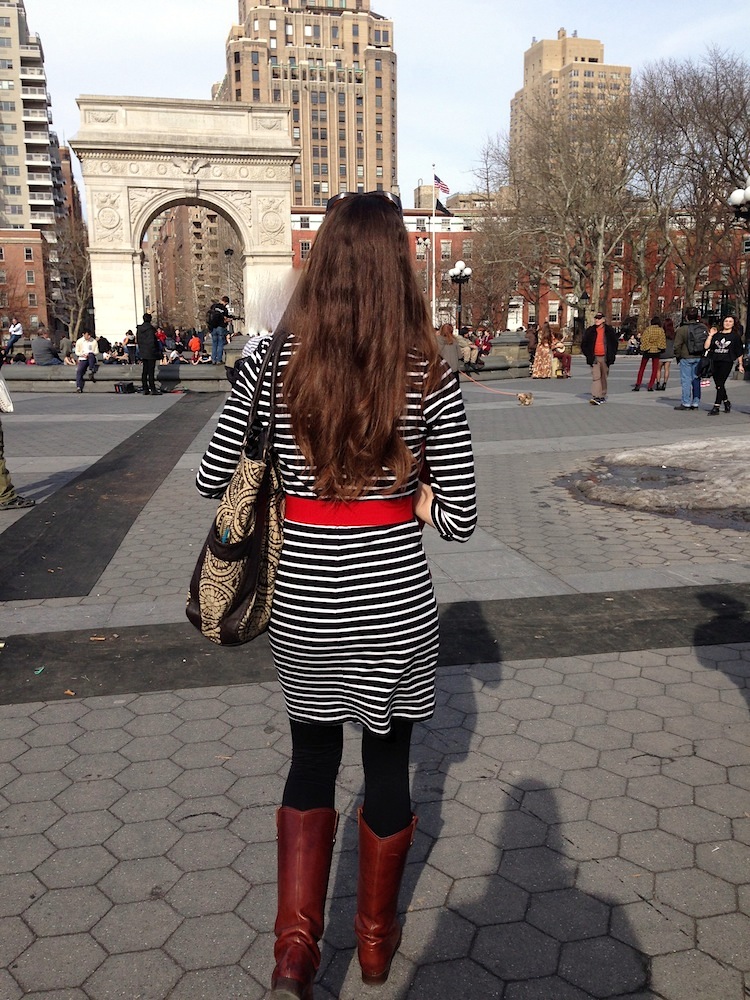
When I worked in professional offices in New York City, Washington, DC, and Boston, I went through a bell curve of frugality-while-working. In my first job in NYC, I only made $10K for the entire year since it was a position through AmeriCorps and so, I didn’t have much money to spend. Ergo, I was pretty frugal. As I advanced in my career–and earned more as a result, ending up with a great salary–I began spending more (both on work and on all other aspects of life). Next up was the revelation that my husband and I wanted to leave the city and move to a homestead in Vermont, which prompted our embrace of extreme frugality and thus, a decrease in all of our spending–and especially the spending on our jobs. Sidenote: if you’re interested in the long version of this story, check out my book!
You will not be surprised to hear that I think it is entirely possible to be a wholly professional person and a wholly frugal person. It’s kind of like parenting while frugal. It’s all about being selective, spending on what matters to you, and hitting up that used market.
During my Frugal Work Times, as I’ll call them, here’s what I did to keep costs low:
Clothing:
- Almost every single article of clothing came from high-end thrift stores. I’d go to thrift/resale/consignment shops in wealthy neighborhoods and find killer deals on professional outfits. My other sources were garage sales, hand-me-downs , and Kohl’s. I haven’t been to a Kohl’s in years, but they had some seriously good deals on professional clothes back in the day.
- At my zenith of frugality in 2014, I decided to put myself on an all-out clothes buying ban, which I just realized I’m still on, except for this one pair of winter boots. I’ve detailed this clothes buying ban in approximately one million different posts, but the short version is that I have enough clothing, I do not need more clothing, and it’s more environmentally-friendly and thrifty to not buy clothing.
- Frugalwoods readers have lots of superb advice on professional wardrobes below and remember: the best sale of all is to not buy anything. If you’ve been working for a number of years, you probably already have enough clothing to cover your needs. At the very least, there’s no reason to buy new clothes every year. And yes, I maintained my clothes-buying-ban while pregnant (twice).
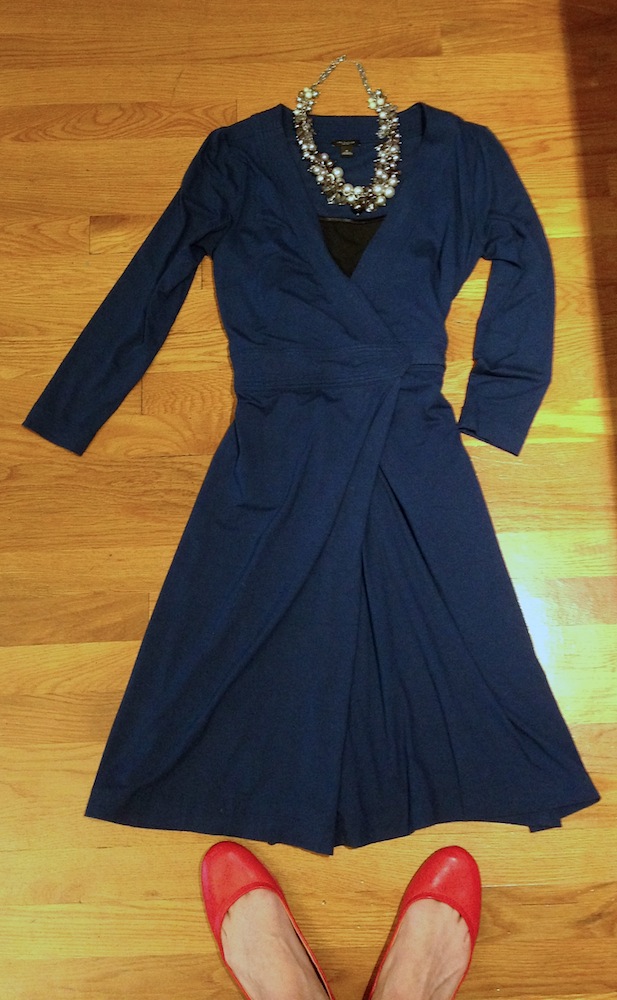
Don’t Buy Dry-Clean Only Clothing (and other clothing care tips):
- Dry cleaning is super expensive (and bad for the environment), so my solution is to own very little dry-clean-only clothing. Most stuff can be washed in the washing machine in cold water on a gentle cycle and hung up to dry. Thus far, I’ve only ruined one blouse by washing it in the washing machine (whoops). Everything else comes through just fine! I DO dry clean very fancy dresses (such as those worn to weddings) and suits, but those are infrequently worn items. Don’t create a professional wardrobe dependent on dry cleaning.
- When I was required to wear suits for one of my jobs, I’d always wear a blouse underneath that could be washed and then I’d spot clean the suit. When I commuted by subway during sweat-inducing Washington, DC summers at this particular suit-requiring job, I’d wear a sundress on my commute and then change at work in order to keep my suits clean.
- Mr. Frugalwoods, for his part, has spent almost all of his career at a tech company with no dress code, so t-shirts and jeans have always been his jam, which is supremely cheap (especially since 99% of his shirts were free giveaways… ). When he does need to dress-up, he likes wrinkle-free dress shirts that can be washed in the machine and hung up to dry with no need for ironing (good thing since neither of us sees the point in wasting life away by ironing… although I did iron some curtains last year and found it oddly soothing… probably because I was alone in the basement with no children clawing me… ).
- Caring for the clothes you do have is another important element of not buying new clothes all the time and I have a whole slew of tips here: Clothing Care For People Who Don’t Buy Clothes
Hair, Nails, Makeup, Jewelry:
- I used to paint my own nails and wear inexpensive make-up from the drugstore. Eventually, I decided to let go of both the makeup and the nail polish (except for special occasions) for numerous reasons, which are detailed here: Less Makeup, More Confidence: My Frugal Beauty Manifesto.
- I also used to get a massively expensive (circa $120) haircut every few months, which I eventually, finally let go of in favor of having Mr. Frugalwoods cut my hair. Yes, you read that right: my husband cuts my hair, it costs zero dollars, it looks totally fine, we are still married, and I doubt I’ll ever go to a salon again.
- For jewelry, I heartily agree with the Reader Suggestions below to have simple pieces that you rotate through. I usually rely on pearls or a combo of red and black accessories. Fake all the way, baby.
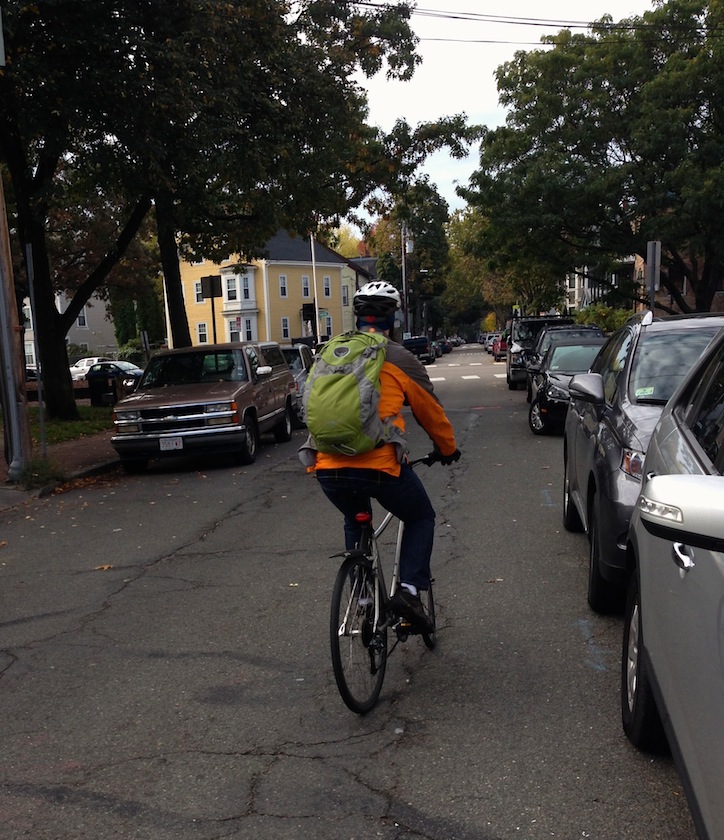
Commuting:
- I did many different things to get to work over the years. The cheapest was availing myself of an employer-provided Subway pass in NYC–a totally free commute!
- The most expensive was driving my own car to work every day and paying to park (ick), although my car was an ancient minivan. Middle ground was carpooling with a co-worker and contributing towards gas money and also paying for my own bus pass to take the bus.
- My husband was far more frugal with his commuting than I ever was. He biked to work every single day (even in the Boston winters!!), which–even with the cost of his bike, bike maintenance, and one fairly scary bike accident–was still the cheapest method by far. Not gonna lie, I wouldn’t bike commute in Boston because I was afraid to, but he managed it to great effect.
- I feel like the golden ideal for me is my current absence of a commute–unless you count walking across my house to my computer….
- Point here is to consider all possible commute possibilities and to weigh the costs of each. Additionally, if you have a crazy long/expensive commute, consider if a move is in order: either to a new house or a new employer. Easier said than done, I totally realize, but Your Money Or Your Life opened up my mind to all the ways in which I was using my time out of alignment with my priorities and a long commute was certainly one of those things! Spending hours every day in car/on a train was just not how I wanted to spend my life. Consider if it’s how you want to spend yours.
Continuing Education:
- My only personal experience here is that I worked full-time at the university where I earned my master’s degree in order to quality for free tuition. A great deal if that’s something you’re able to swing and you need an advanced degree.
Lunches, Dinner, Drinks!
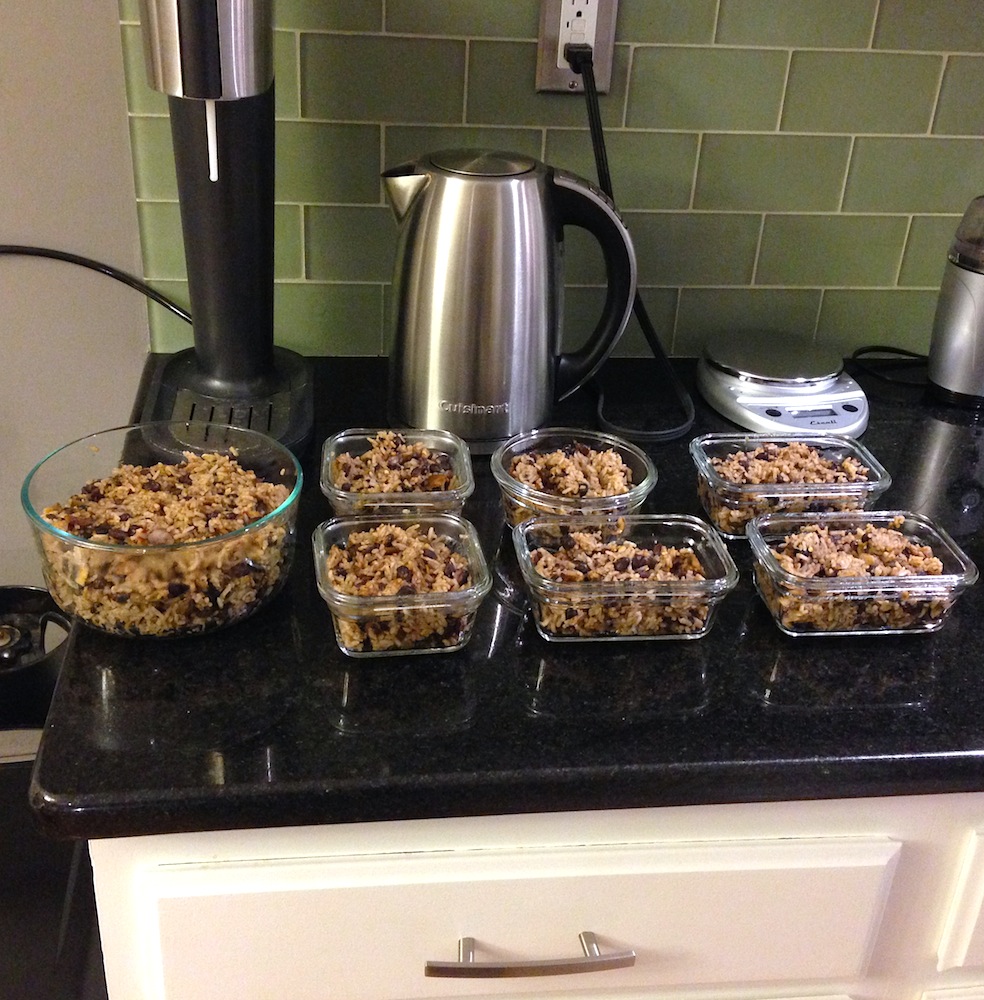
These were my worst offenders when I was spendy–food gets me every time!!! But when I buckled down, I realized I could still achieve the same ends (networking, fun with colleagues) for drastically less by doing the following:
- Brown bagging my lunch. Oldest trick in the book and you’re probably sick as a dog of hearing it. BUT, it’s one of the easiest ways to save more money every single day. Just do it and add up exactly how much you’re saving. Here, I’ll do it for you: Let’s say you buy lunch for $10/day. That’s $200 per month, or $2,400 per year. Whoa!
- When my office went out for a group lunch, we often went to the office cafeteria, where it was completely acceptable to bring your own lunch (I was never the only one!). And on the rare occasions that we went to a restaurant, I’d often order a super inexpensive salad and then eat my lunch-from-home later at my desk (I cannot survive on small salad alone!).
- For afternoon breaks, I’d walk to the coffee shop/cafeteria with my colleagues and just not buy a coffee. The goal of those trips was to socialize with work friends, not to buy coffee, and no one cared whether I actually bought anything or not (we weren’t hanging out in the coffee shop, so they didn’t care either). For the record, if I’m going to sit down at a coffee shop or restaurant and hang out, I always buy something.
- For after-work drinks, I’d either get a single glass of inexpensive wine or beer, or, a seltzer water/club soda. No one ever noticed or cared or commented. Everyone is much more focused on the conversation than to be bothered by what you are or are not drinking.
- If people seriously pester you about why you’re not buying lunch or drinking, you can always cite your health and that you’re trying to eat better. Or just say you like leftovers for lunch. Or that it’s none of their business. I know that for many folks it feels awkward to frame things in terms of financial goals, so don’t. Use literally any other excuse you’d like.
Think Outside The Box

Consider all aspects of your employment and whether or not it’s actually cost-effective for you to work. Are there significant efficiencies/savings you could reap by reducing your hours, working from home, or even changing employers? The Uber Frugal Month Challenge takes you through the process of making these assessments, but the basic idea is to ensure you’re not spending as much to work as you’re earning, which–when you tally up childcare, commuting, take-out for dinner, lunches, coffees, clothing, and convenience services–can actually be the case! I’m not kidding!
As previously mentioned, there are many other considerations to keeping a job, such as your longterm career goals and the overarching concept of how you enjoy spending your time, but the key is to understand the math behind your spending on your job vs. the money you’re earning from you job.
Also, make sure you’re taking full advantage of all the benefits your employer offers, such as:
- 401k/403b retirement plans
- Health insurance and all related benefits, such as gym memberships
- Any and all free food (something I masterfully did for years)
- Free professional development opportunities
- Free mentoring programs
- Basically anything else offered for free or reduced rates, such as discounts at local retailers, free tickets to local events (one of my favorite perks at my last job!), in-office yoga classes, free coffee, etc! Check with your HR department for a full list of available benefits. I was amazed at all the things my former job offered through various different community partners and it was a wonderful way for me to be more engaged with both my organization and my community.
How Frugalwoods Readers Stay Professional On The Cheap
Ok, ok, that’s quite enough from me. Let’s see what advice you all had to offer! This topic ended up being one of the most robustly commented on Reader Suggestions, which tells me this is on many of your minds. I’ve divided up the suggestions by category, although there is some overlap. Apologies in advance for the epic length of these suggestions, but most of them were so freaking on point that I included them in their entirety. Thank you to everyone who contributed! You all rock!
The Wardrobe
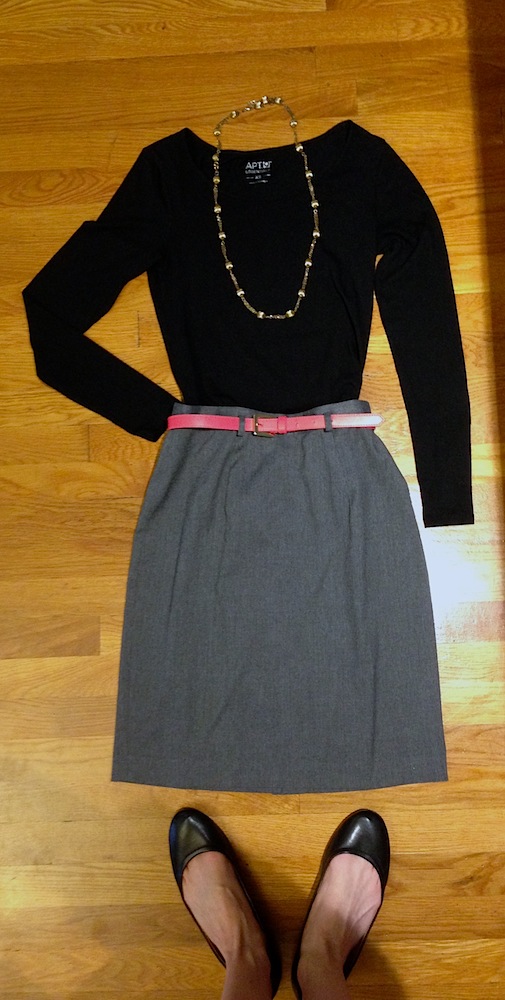
Natasha wrote, “I think there is a misconception among women in particular that “professional” equates to “fashionable.” You don’t have to have the latest styles or spend a fortune to dress professionally. I have a limited, simple professional wardrobe, but I spend a bit more money on quality clothes that will last. I’ve been rotating through the same three pairs of pants (black, dark grey, and light grey) for over five years. I use a rotation of basic tops and cardigans for most of the year, and some heavier sweaters for the depths of winter. I wear the same pieces of simple jewelry most days, minimal makeup, and I don’t do manicures or pedicures.”
Hillary said, “I intentionally buy/obtain (thrift, buy on sale, buy full price, gifted by friends) work wear that looks classic (lots of versatile neutrals and solid colors) and is machine washable. I wash all my clothing on cold, gentle and line dry. Dry cleaning costs are ridiculous! I have several plain shift dresses in solid colors (4 black, 2 Navy, 2 beige) – change up accessories, hairstyle, or shoes and it’s a new look. I don’t capsule wardrobe, but I essentially wear “Geranimals for adults” with solid color tops, neutral pants/skirts, and dresses. Pick any two or a dress, flats, earrings, watch and go. ”
The less flashy your clothes, the less memorable – and that’s a good thing! I’ve worn the same black dress probably 6-8 times in a month and NO ONE has ever noticed or mentioned anything. We are more than our clothes.
Melissa said, “I do what a lot of folks do here–I have a ‘uniform’ of dresses and cardigans purchased second hand/deeply discounted. I don’t tend to wear makeup. I tend to wash & go with my hair. I brownbag to work (down to my afternoon coffee…).
One thought on job hunting–when you’re in an industry with expensive licenses/continuing education/professional organizations, it makes sense to negotiate those costs into your job/contract. For example, I’m a medical social worker. My work covers my social work license fees, fees to join the NASW (national association of social workers), and continuing education fees. My work does the same for all employees (as most of our staff has a license, those fees and professional organizations are almost all covered.). Friends of mine from graduate school don’t get those benefits–you need to look for them and ask for them! But it probably saves me $300-$500 per year for my company to pay for these.
Finally, looking neat and classic goes a long way. Take care of your clothing and shoes. Move along clothing showing wear and get fabrics that last (I hate to say it, but I rarely wear natural fibers as they show wear faster than space age poly whatever’s….). I wear good jewelry I’ve accumulated over the years but nobody has commented that they see me wear the same pair of diamond earrings every day for the last year. Likewise with my pearl necklace and watch. Classic and good quality fade into the background, which is what it should do. I was reflecting on my outfit this morning- a dress from a 50% off day at Savers ($13.99 in half, for the record 😉), a four year old cardigan purchased at TJ Maxx for $19.99 and one of my five pairs of work pumps. And I’ll keep wearing all of it until it can’t be worn anymore because of condition or size. People constantly comment on how nice I look at work, but really it’s easier than pressing pants and blouses every day! Dress a little nicer than everyone around you and you’ll stand out as someone competent and worthy of being promoted. Make sure your work product backs up how you look. 😉”
Holly reported, “Business casual corporate here. I have adopted s uniform of sorts. Dark dress pants (I have black, grey, navy). I have a few open cardigans in the same colors. I rotate the blouse/shell I wear underneath and keep my accessories simple & classic (pearl earrings). People don’t recall what you wore specifically–just the kind of image you project (polished & professional vs sloppy). I paint my own nails. Brownbag lunches. I don’t dry clean – I machine it wash & hang dry. Also – check out the consignment shops in the wealthier zip codes around you to look for secondhand career wear.”
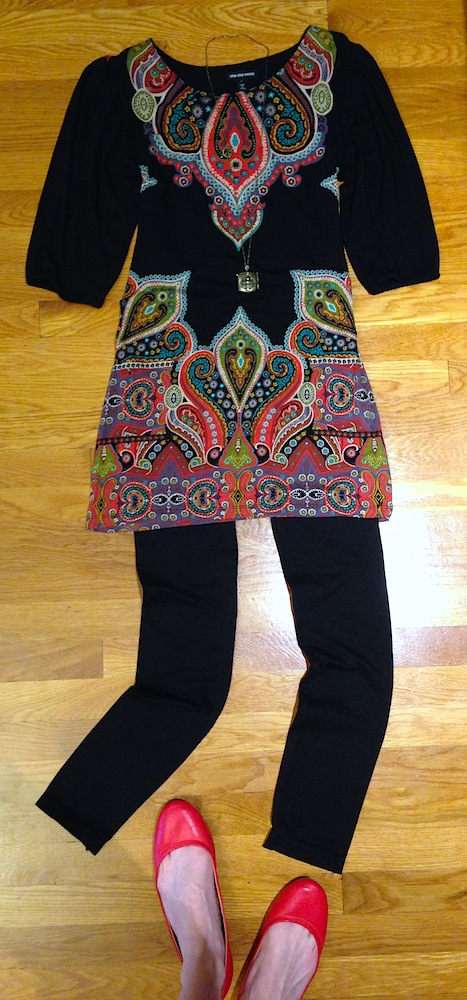
Hope suggests, “Shop secondhand stores for quality clothing, and then wear it all the time. Personally, I try to remember what my mom always told me “no one is looking at you, they are all worried about themselves.” I just don’t think anyone cares all that much if my make-up is done or my hair is perfect as long as I look presentable.”
Stephanie said, “I just make sure there is significant overlap in my work and casual clothing. I usually wear jeans and business casual shirts to work. At home, I wear a lot of tank tops and yoga pants, so my casual tank tops double as undershirts for my nicer work tops. My work clothes are appropriate for dress-up events, so I don’t have to buy a lot of extra clothing for those, although I do keep a couple nice shirts/shirts/dresses/heels for date night.”
Nichole wrote, “I work in manufacturing, where the dress code is all over the place. I wear a company shirt every day, whether it’s a collared shirt or a T-shirt. It makes it simple to get ready, and I always look polished. But these are all shirts I got for free – from training, conferences, and celebrations.”
Anna said, “Working in a professional office of women, I wear a lot of grey. You can put varying shades of grey together for all seasons. If I wear black in the summer, people think it’s weird. If I wear grey, no one mentions it. It also helps that I sew, so I can make necessary repairs to my existing wardrobe. Most dry cleaning can be hand washed or washed on delicate. I probably spend $15/year on dry cleaning.”
Blair wrote, “I am a high school teacher, and it took me years to realize that kids REALLY don’t care what you wear. I have a handful of favorite skirts and tops that I mix and match, and I wear them with leggings and boots in the winter and with flats in warmer weather. I also mix up accessories, as a lot of other commenters have mentioned. One of my classes does a unit on consumerism, so I use my practice of buying secondhand clothing and mix and matching outfits as an example of saving money and being green (which is one of the things we discuss in the unit). Once the topic is open, kids quickly start sharing how much of their stuff is secondhand and even point out to me when they’re wearing something that belonged to a sibling or came from a thrift store. I hope it helps to make my classroom a safe space where the amount of money you have doesn’t matter- frugality AND life lessons for the win.”
Lisa relies on a, “Capsule wardrobe. Best financial/professional decision I’ve ever made. I found a pair of pants I like on sale, bought two pairs each in black and gray. I have about seven shirts, all blue/ white/ black or some combination. One black suit with pants and skirt. That’s it for work. A caveat I’ll put out here – I’m a traveling sales rep so the same person rarely sees me more than 1-2x per month. That makes it easier. For makeup, I only wear mascara and sometimes powder. For hair I use $3.75 gel. I’m lucky, my company does pay for the expected happy hours/dinners, etc.”

Randall suggests a, “Simple minimalist wardrobe of good classic basics that can go year round. My shirts are no-iron so I can wash and other items spot clean at home. I am a neat freak so this works for me. I get nice shoes but again classic and wear them until they can not be repaired any longer. Often client dinners etc can be expensed but as I am so minimal and frugal day to day the occasional say happy hour with colleagues is manageable. My watch is my phone. When I travel for work I often add a day or so vacation if the city is interesting to me so the bulk of the trip is company paid and I get some down time too. Day to day I bring my lunch and all snacks so going out to lunch is rare so it can be managed. Btw. PB&J on wheat with peach preserves is the best!”
Lena wrote, “I am quite lucky: as a Christmas present last year, all the employees of the company were treated with a quality rain coat – since I bike to work it has proven itself very efficient and super comfortable. It doesn’t bother me that it has a company logo on the back. But most importantly: I scored with the managing team since they noticed that I wear it to work. Double bonus: free clothing and being on board with the company.”
Sherry said, “When I worked in an office that required us to wear business suits, I was able to find a lot of professional clothing at Value Village. Most of what I purchased there were name-brand clothes, such as Nordstroms, for a tenth of what these clothes cost new.”
Julie shared, “For my 5 months a year job, my clothes come from consignment shops and I generally buy brands that I wouldn’t full price for but are classic and well made. I usually have credits to use from bringing in clothing I’m no longer wearing. Anything new comes from clearance racks with coupons for extra % off. My make up consists of tinted B.B. cream; one tube lasts for months, and a little blush and lipstick. I can’t remember the last time I bought either. I do my own nails; I treat myself to a pedicure a couple of times a year. I can afford new clothes, etc., but I prefer to spend money on what is important to me.”
Alice wrote, “I have a very limited wardrobe of mix and match items that are machine washable and durable. My skirts have a bit of elastic to accommodate weight fluctuations. I don’t worry about wearing different things and that keeps my clothing costs low.”
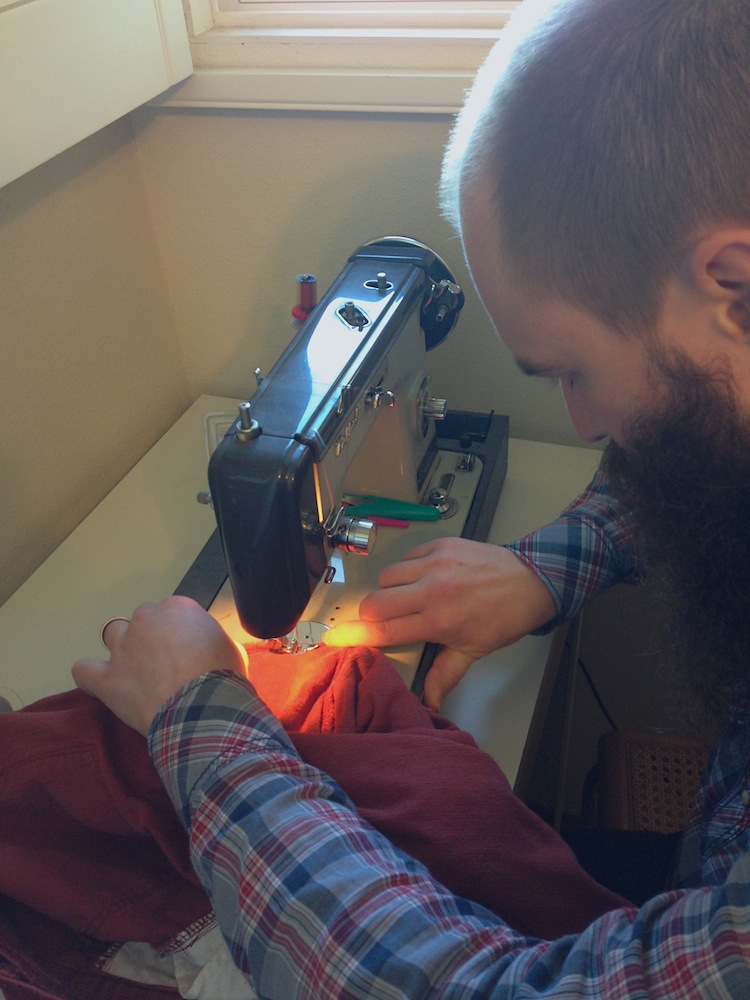
Sarah said, “Most of this has been said, and is good advice, but I’ll add another one — learn to sew :). Once you have your work wardrobe, you want to keep it, so being able to mend it (and have it still look professional, not sloppily mended), is really helpful! I keep the buttons that come with shirts! It means you can replace the buttons when they wear off. (I actually keep all my buttons. It’s useful!) And if you don’t have replacement buttons, it’s often cheaper to buy a set of buttons then it is to replace the whole shirt or sweater. And, if something is nice but doesn’t -quite- fit, you can tailor it and make it look awesome! (Really useful for the free second-hand clothes that aren’t quite in your size!) Putting in darts is a bit more complicated, but hemming something to be shorter or taking out a hem to make a pant leg longer, isn’t that hard, I promise. I do it while watching Netflix to get it done. Plus a lot of mending can be invisible. I’ve re-hemed several favorite work skirts and re-sewn several seams, and even I can’t tell where I sewed them without turning them inside out to check. I figure so long as your mending is either neatly done, or invisible, there’s really no issue.”
Jessica shared, “This is a big struggle for me. As a CEO of an NPO, I must attend many events– often semi or formal attire required. Just this year, using Mrs. Frugalwoods ‘no clothing ban‘ as an inspiration, I wore the same dress to three concurrent events. I learned to change the accessories (with ones I already had). No one knew– or had the good graces to call me out on it. That alone saved $600 at a minimum. I have tailored back work lunches to drinks or coffee, which are far more economical. Lastly, when I go to networking events, I get a glass of water (still tip the bartender!) instead of a glass of wine or cocktail. I was always hesitant to do so, but the savings is huge and its better for my waistline! :)”
Kathleen wrote, “I work as a nurse in the operating room, which means I wear option 1 or 2 into the hospital and then change into my hospital supplied scrubs and at the end of my shift I change back into the clothes that I wore in .
Option 1) blue and white scrubs that I would have to purchase and maintain on my own dime. I do not do this.
Option 2) business casual on the way into the hospital and at all hospital meetings. To me this is solid color tee shirt, skirt, and cardigan with flats. Often the only thing that I change every day is the tee shirt as the rest is being worn for my ten minute each way commute and I wear the tee shirt under my scrubs. I only wear the cardigans if I am at a meeting. I have dedicated shoes that live in the OR and I wear the flats in and home. All of my clothes are wash and wear. As for the rest of it, I don’t wear makeup and I am not allowed to wear jewelry or nails or nail polish. My beauty product outlay is minimal. I do spend money on good shoes for my working hours. I am on my feet for 8 hours plus a day. I spend between $90-$130 on shoes a year. I have no desire to advance to management. But if I have to do a special occasion I wear the one dress that I have, that I bought for my niece’s wedding six years ago, which is also wash and wear.”
Valerie wrote, “I have hosted and participated in clothing swaps with friends and colleagues. A fun reason for a party and great way to re-vamp your wardrobe for free!”
Hair, Nails, Jewelry

Tracey said, “Love this thread! I have been changing what I do to be more frugal. I no longer colour my hair and have been increasing the time between getting my eyebrows shaped to six weeks and hair cuts every three months. I have stopped pedicures and manicures. I got my colours for clothes done and now I only buy clothes which fit my shape and colour palette – this and the 3 day rule has saved me thousands of dollars each year. I’m tempted to try a clothing ban 😊. I use mineral foundation which I buy on special and lasts a long time and I’m not into jewellery so I’ve stopped buying it and only wear Amber beads. If I go out to lunch I take my own to cafes or it’s in a public park. I am lactose intolerant and do not like soy or almond milk so suggest coffees in places I can BYO or have a herbal tea or water. Key for me is planning ahead 😊”
Jan shared, “I coupon makeup and hygiene and save at least 70% off retail. My nails are short and clean and clear. I handle those myself. I am a legal assistant. Most professional offices are more casual than they were at one time. I don’t buy a lot but I try to buy things when they are significantly on sale (70% or b1g2) and are interchangeable. I don’t dry clean. If I get it cheap enough, I can replace it for the cost of dry cleaning. I am part Asian so I can get away with long and straight hair. If I do cut it, it’s a simple style. I color myself with, again, couponed hair color. I can avoid most lunches/dinners, etc. If I feel that I need to go (which is rarely), I keep my meal simple. I am not a millennial. I have had my job for 22 years and developed a good reputation in the legal community so I rarely participate in social functions.”
Continuing Education
Sherry said, “I’m a CPA and am required to get 80 hours of continuing professional education (CPE) every two years. CPE can be very expensive. About ten years or more ago I became a beta tester for new Thomson Reuters online accounting courses. Doing this earns me CPE for free. I’ve rarely had to purchase CPE at the end of the two-year period, so beta testing is a very frugal way to keep my CPA current. Here is the link. About half-way down the page is “Become a Pilot Tester” and that’s where CPAs can sign up to do the beta testing.”
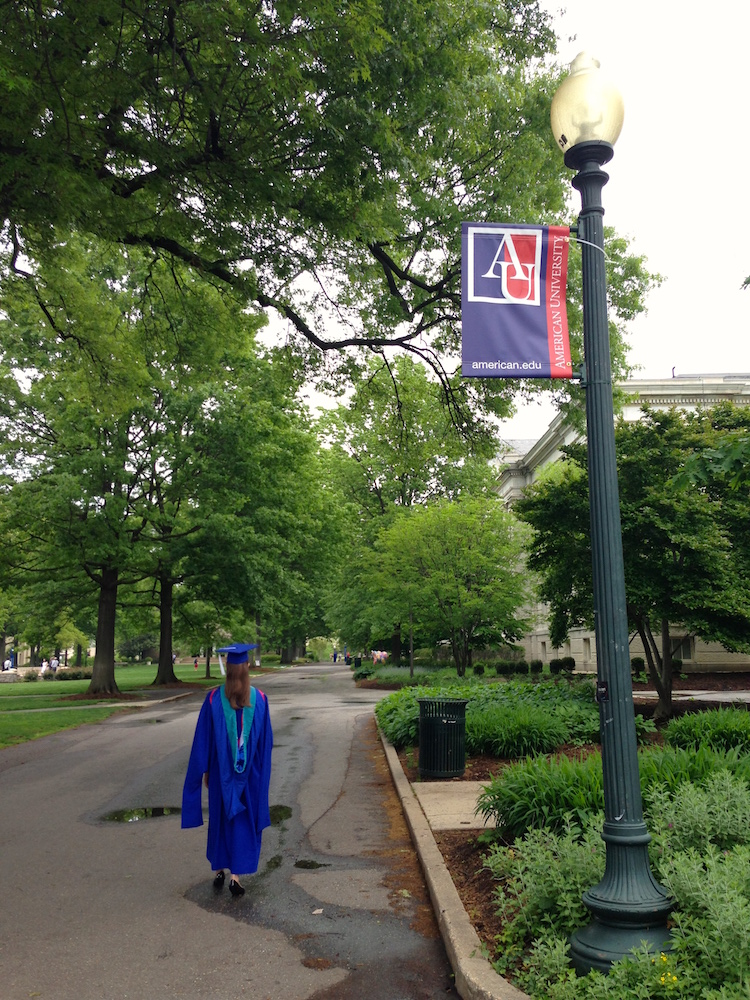
Erin said, “Continuing education is a big part of my field (dietetics), as is membership in our national professional organization. When I renew my membership each year I always have the opportunity to enroll in a sub-group that offers education on specific topics, for a small fee. This has proven to be a great investment based on the many free continuing education courses (with credits!) that they offer each year. Perhaps this is possible in other fields, too!”
Melissa shared, “In healthcare (I’m a clinical social worker in a medical setting) there are tons of opportunities for free Continuing Education (also a requirement for our license). I get lots of CEU’s through nursing homes, elder service agencies and hospice agencies, which fits very well into my area of practice.”
Jennifer wrote, “I’m also a CPA. I get my CPE free by visiting the big 4 websites and signup for their webinars. It’s a slow process since most are only 1 credit for 1 hour of time but it’s super easy. You don’t have to answer questions just answer the poll questions which demonstrates your presence. I sign in from my desk and work while I listen. Also, if you have certification fees for a license ask your employer if they reimburse those fees.”
Jackie said, “I always take free Continuing Ed when I can. I supervise an intern which gets me CE credit plus free admission to a conference for more CE credit! And I take advantage of the $100 conference stipend my employer offers every year.”
Kelee wrote, “Make sure you keep receipts of any courses, registrations etc as you may be able to claim them back on tax as self education expenses. Keep receipts for formal business lunches & events too. If your unable to claim these things through your tax system it will at least give you a good idea of how much you’re actually spending & where you might be able to cut back.”
Jess said, “I am fortunate to have found a company that offers educational stipend to be used toward continuing education. The organization also pays for my license and offers a small uniform stipend. I make sure to take full advantage of these benefits. I utilize thrift stores for work apparel and bring my own lunch to work.”
Faith wrote, “As a nurse, I allow my hospital to pay for my continuing education. Whether it be through free education classes they offer or through a program they subscribe to that allows us to work on our continuing education hours. I make sure to go to all free classes because if it’s free, why not take advantage of it?”
Networking Lunches, Cocktails, and Dinners! Oh my! Plus Office Gifts!
Karen wrote, “The biggest money grabber for me when I worked for a municipality was the celebration of birthdays. Seems someone came by my office door to collect my ‘share’ of the celebration for the big boss, the lower supervisor, & then just the coworker in the next stall. Women were the worst at constantly doing this. Add in any deceased family members (people I didn’t even know), baby showers (yes at work & for 2nd & 3rd children ughh), & there was a constant collecting of $. Near holidays they would plan pot luck lunches even though we were going to spend the holidays off work & with our own family. You were expected to bring enough of whatever to feed the group. Now, they would always say you could opt out & not participate, but they made it very uncomfortable. I began opting out when I realized I was spending more on coworkers birthdays than I was with my own family members who lived out of town. Really I worked with a lot of the same people for years over a 30 plus year career. When all was said & done & I retired, I realized none of these people were true friends, ie we were just thrown together for hours a day for months or years. Be true to yourself & just say a heartfelt Happy Birthday or Sorry for your loss! Don’t let the pressure get to you esp when they 100% ignore your birthday because you don’t ‘participate.’ So sad to me that my fellow women are the absolute worst at this. The men could really give a flip.”
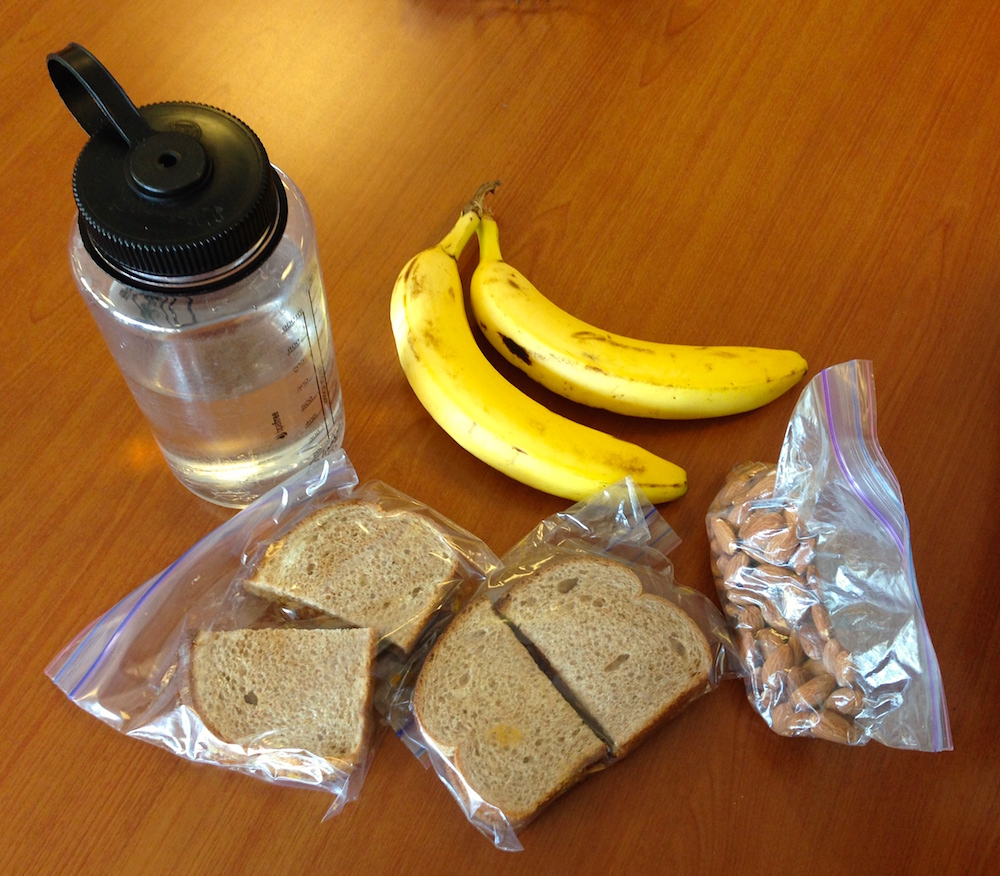
Gloria said, “I always brought my own lunch, snacks and coffee to avoid eating out during the work day. My husband also brings his own lunch and coffee and bikes to work. We followed Mrs. Frugalwood’s advice and made lunches in bulk once a month so it was easy to grab and go! For dinners out with coworkers we would first eat a little at home before going out as to order a smaller meal. And ordering a salad is sometimes cheaper and often healthier than other meal options. For drinks, no one can tell if you’re just drinking a soda with lemon instead of paying more for an alchoholic beverage. We also practice a strong don’t drink and drive approach so volunteering to be the designated driver lets us save on social drinking, encourages carpooling and sometimes gets a free soda from the bartender (also very applicable when I was pregnant).”
Kristine said, “You can ask for water with ice in a whiskey glass at any networking events. The perfect “gin and tonic” or “vodka and tonic.” Just remember to sip it! I simply explain to the bartender that I’m not drinking but want to fit in, and they are always willing to hook me up. I like to order an appetizer and eat as dinner since it’s usually cheaper, or I’ll eat a snack beforehand and then munch on free snacks at the event. I’m always happy to take leftovers home, but only when I’m one of the very last people in the room since then at that point I’m helping clean up. I always try to participate in networking events at work, because networking is key to personal growth and opportunities. My mentors are always willing to offer advice and assistance, and their perspectives are invaluable. You can only meet mentors if you’re willing to get out and network.”
Amanda said, “I’ll comment on networking costs. In my agency, its often who you know that helps you develop professionally not how long you have been somewhere. When there’s a networking mixer in my area AND it has an education component, like a speaker or a mini presentation, ill try and attend because the education component may make it tax deductible and I know ill go away with something from it from the time invested. I pass on the pub crawls (its not worth the time away from family and I don’t drink so its not my scene… However if im job hunting, I will go for a half hour or so and just not drink, mingle and duck out. I prefer to focus on the lunch and learns, which is often a smaller fee to attend that covers or includes lunch. This way i get the face time in.”
Anna said, “As for drinks/dinner with colleagues, I just don’t do them. I work all day, so my evenings are for my children. That’s just a non-negotiable. There’s an occasional working lunch, but that’s only a couple times a year. For the office Christmas party, we draw names and are expected to buy a $25 gift. I can usually get around that by sewing something personalized by using fabric from my existing stash.”
Katie wrote, “The key with lunches out is to say yes to those that are with people you actually want to network & build relationships with. In my work in financial services, that is 2-3 times a month. We just include us as an expense in our budget. Lunch with “work friends” happens in the cafeteria with a packed lunch. Sometimes they will go out to eat, I just join them on days where they eat at the office (we have a cafeteria at work so they can still buy if they don’t want to pack). If lunch as a purpose and aligns with my values (wanting to make new connections) I am happy to spend money. It is easy to pick something cheaper on the menu vs something more expensive.”
All Inclusive Thoughts
Brian said, “Great question Mrs. Frugalwoods! Though my needs might be different from a woman’s, I get any new clothes from thrift stores, which often have great deals on gently used dress clothes. I cut my own hair, and when a coworker asks where I got it done, they are shocked that I do it myself (in other words, they can’t tell the difference). (It’s also important to point out that I don’t have a buzz – it’s short on the sides, longer on the top a la David Schwimmer.) I also ride my bike to interviews that are within biking distance – I get surprise from sources but it’s never been a problem. Most of the time I get admiration with a “I should start biking too…” Once I met the mayor for a photoshoot, and when I rolled up on my bike he said “what, do bikes come standard issue at City Pages?” since my co-worker rode his bike often too. I honestly think these expectations are ones we put more on ourselves than others do (not always, obviously).”

Wesley wrote, “I’m an attorney and always very intentionally picked more informal and life/work balance places to work. I bike to work and can wear business casual for most part. When I do have to wear suits (mostly hand me downs from friends that stopped working after kiddos), I only wear them in court. I would literally drive/travel in comfy clothes, change into suit and then back into comfy clothes. This really limited how often I needed to dry clean since I was only actually wearing the suit for an hour or so. I also just really hate suits so it was mostly a comfort factor. I bring my lunch which most people assume is because I am a healthy person and use my lunch break to walk. My co-workers have now started doing same more often and one even started biking to work too!I went to all girls high school so the hair/make up thing never caught on for me and was used to wearing a uniform so I prefer having a very limited closet but I’ll do clothing swaps with friends to refresh wardrobe (and it’s very fun) and have gotten free make up samples at department stores or from friends. I am licensed in two states but went inactive in one to avoid fees but can easily reactivate if I need to.”
Katherine wrote, “This is more of a tip than a method, but I have the Banana Republic credit card which I use for everything and pay off monthly. The rewards program is great. I consistently earn $50-$100+ in rewards each month which can be spent at BR or any of their other brands. By waiting for one of the frequent 40% off sales and spending points, I get a significant portion of my work wardrobe for free. Oh, and although I do cut my husband’s hair, I’m never going to stop getting my hair done professionally, ever, but balayage does last six months so it’s more affordable (and better for the hair) than traditional highlights.”
Chris advises, “1) Good quality clothes from a consignment store that carries a lot of Ann Taylor and Talbots. 2) don’t paint my nails, minimal makeup 3) I don’t ever buy clothes that require dry cleaning anymore. This is all moot now, as I’ve been working from home the last 3 or so years. I don’t miss the long sessions of ironing clothes, packing lunches, sitting in traffic. I could have earned more money, but I’m at a point in my late career where I’d rather have the time.”
Laura shared, “I’m extraordinarily lucky that I work as an administrative assistant at a university and they do not care what I’m wearing as long as I’m clean and what needs to be covered is covered. 🙂 What they do care about is how well I do my job. It’s well known that I have foot issues so no one cares that I wear athletic shoes with supports. Jeans and casual tops are acceptable as long as they’re clean and neat. So lucky here. For lunches out, some are with co-workers who are friends and we usually go somewhere modest. Work-related lunches are sponsored from discretionary funds; I actually get quite a few meals for free. I don’t drink alcohol so no expense there. I also don’t wear makeup or do mani-pedi’s, and I stopped cutting my hair and grew it out. I guess I’m just a slob. 😀 The biggest cost is paying for parking when I need to drive in, which is about half the month – a $200 annual permit + $10/day. They pay for my T-pass so taking public transport is free, though unreliable, hence sometimes needing to drive. To be honest, the biggest frugality-at-work tip I have is, be good at your job, always do your best, learn the little ins-and-outs as well as the big things, and especially always be kind and friendly and give the best customer service you can. That is what people notice, not your hair or dress.”
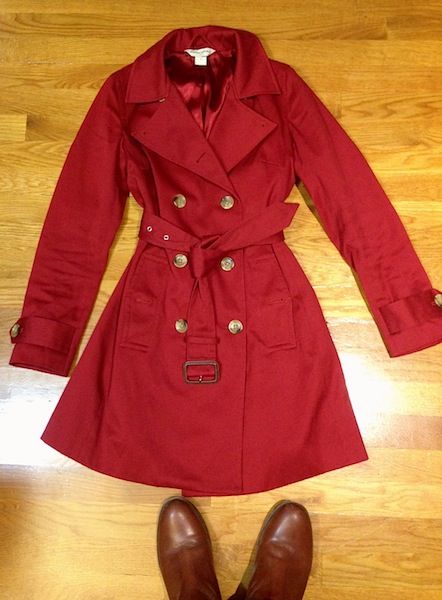
Liz wrote, “I work full time as an NP. I am not allowed to wear scrubs and am expected to dress professionally. Being in healthcare I don’t wear anything that requires dry cleaning. I’d go broke. I make my base black and have experimented with wearing the same pair of black pants all week. Guess what? No one notices! Men do it all the time so why not women too? Having a uniform helps too. Mine is black pants, cami and cardigan or jacket. I have one really nice watch that I wear every day and I only wear a wedding band. I wear the same gold necklace and basically never take it off. I rotate between CZ studs and rose gold hoops. This is my signature style. It makes shopping and getting dressed each day easy and fairly cheap. I mostly shop secondhand and get great name brand clothes, some designer for a fraction of retail prices. Finding a great hairdresser who can give you a cut that is easy to style as well as being low maintenance saves money also. I color my own hair when I feel like it. More women need to embrace what God gave them! As for work expenses, I happen to work for a company that pays for continuing education, licenses and certifications. They also pay travel expenses. I am required to rent a car for trips so I use points programs to earn FF miles, hotel programs and rental car points for future trips. It’s like free money! I also submit whatever I can, no matter how small, for reimbursement when I can. Every dollar counts. If I go out and have to pay for something myself, I limit it to one drink and just “babysit” it and also have a sparkling water. I have one vintage black purse that goes with everything and a black work tote that looks great, is sturdy and was only $45 on Amazon. I think a big part of this stuff is your attitude. I have largely given up caring what other people think and because of that I’ve come to realize that, most of what we think other people think, they don’t. They are too busy thinking about themselves to worry about what brand of shoes you are wearing. If you generally wear the same thing and look neat, clean and professional, you project a reliable, competent image no matter what you’ve got on. I get compliments all the time and kind of laugh because I really don’t put much effort into it. Sometimes the harder you try the worse it is. Figure out who you are, dress accordingly and smile. Your confident handshake and smile are worth a thousand Birkin bags!”
Laura said, “I think this is an area that you have to be very careful not to confuse frugal with cheap. Invest in a quality work wardrobe (I like the capsule wardrobe mentality here) and budget for occasional lunches with colleagues. Going out for lunch doesn’t have to be expensive, I’ve been known to join the group for lunch and only order an appetizer &/or drink because I’ve got a packed lunch waiting on me in the break room. I still get the benefit of networking /socializing with my coworkers without taking a big hit to the wallet. I take the cost out of my personal “allowance” or blow money.”
Jacinta wrote, “I have 2 work skirts and a dress. None need dry cleaning and i rotate my everyday tshirts over the skirts and no one notices. Both skirts are over 8yrs old and still look great because they were good quality. Most offices dont require makeup and those that do you can get away with cheaper mascara and wait for a sale for a good mineral foundation and lip balm. A sensible bun is both time efficient and no one can see that you havent washed it in a while haha i dye my own hair and have since i was 16, pick a color that will complement regroth to cut down on how often it needs doing.”
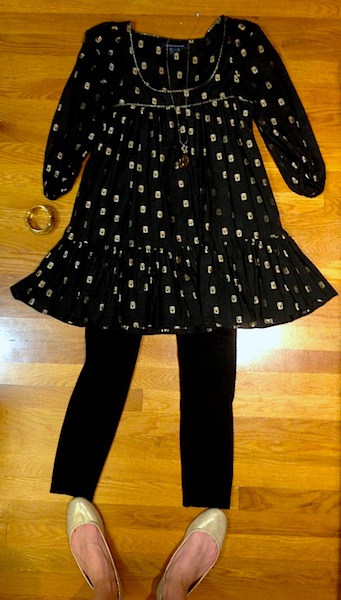
Blair wrote, “I work in Development for an art museum. There is definitely the expectation to “always be dressed to visit with a donor” and we have a fair amount of events. I have gotten by on a rotation of 10 dresses or so, in neutral colors, that I change up with blouses, cardigans, etc. I’ve used this rotation for about 4 years now. I consider it my uniform of sorts. Oh, and all the dresses are machine washable. 🙂 I do my nails myself and maintain a hairstyle/color that lets me go about 4-5 months between visits, eyebrows about every 2 months. I’m not quiet about our FI plans at work, so coworkers are usually happy to brown-bag it with me for lunch. We’ve also found a place that is within walking distance that has a great happy hour, so we’ll sometimes go there after work. It’s nice to have support of your coworkers. There are even a few doing the Uber Frugal Challenge with me! After all, we all work in non-profit and definitely don’t do it for the money! :)”
Miranda shared, “For me, I needed to accept that there is a cost to be a social worker, and give myself permission to spend the money without feeling guilty. That helped a LOT. For some of the costs, like CEUs or a professional wardrobe, I do what I can to minimize the cost. I do free CEUs when I can, but if there is one that will help me be a better social worker that costs money, I will do it. Likewise, the community expects me to dress like a professional, so I do, but I try to do it on a budget. The thrift stores in my area aren’t a good place for professional clothes, so I stick to a uniform. That helps take some of the stress away, and it makes it easier to shop. I picked brands that are everyday affordable so I’m not reliant on a sale. For other things, I just budget for them now. I spent the first few years stressed about how much it all cost, but since they are mandatory I figured I could be stressed, leave the field, or just accept it. I chose to accept it.”
Thinking Outside The Box
Erin said, “Looking after your weight is something I’ve found to be a real saving here- when I’m at a healthy weight, clothes fit better, last longer and look neater- I keep my skin hair and nails neat but plain. I try to socialise with peers without damaging my goals- yesterday I went for a walk with a workmate to get takeaway for lunch, had a great fresh air walk and ate my leftovers when I got back!”
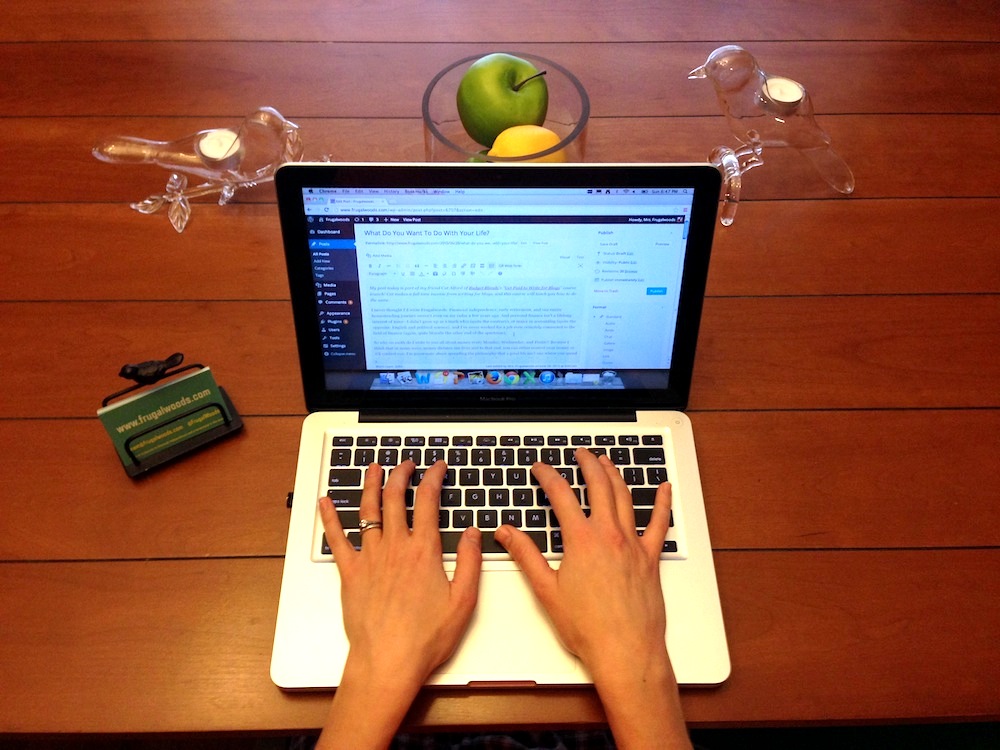
Semira wrote, “I actually chose my profession based on a casual dress code (and general work environment). I’ve worked in ad agencies and am now a marketing consultant. There isn’t a big pressure to look a certain way other than clean :). As a client service person I can just put a blazer over a nice shirt and jeans and get to it. I don’t wear makeup other than eyeliner, don’t do anything with my hair besides wash it and if my nails are done I did them myself. As for career-advancing lunches/dinners/drinks I do go to drinks during happy hour to bond with my colleagues, but otherwise opt out. I bring my own lunch to the office when I don’t work from home and only go to dinners if it’s paid for by the employer. The only way to increase your salary a lot and get promoted often in my industry is by switching companies so skipping these kinds of outings hasn’t had a negative effect on my career.”
Kate shared, “A lot of my expenses dropped when I started working from home! If you’re in a role/company/industry that allows for that, jump on the chance. When I shifted to more days at home, I was established enough, that people knew when to reach out to me, even if I wasn’t physically present. It helped that my colleagues were used to staying connected digitally, so being available by IM was as good as being around in person. I also made sure to keep a connection to the office by teaching new hire trainings. Don’t believe I’ve slowed down my career at all. On top of all the advice about wardrobe, I’ll add two quick points – don’t do it all at once and pick a color palette. The point is to build a closet that let’s you maximize your mix and match potential. I find it works best to stagger when you buy things (so things don’t wear out at the same time) but keep some central color theme (like jewel tones).”
Parting Thoughts
Finding a balance between your frugality and spending in order to advance your career is important; but, as many readers alluded to above, what really matters is your work product. Don’t get too caught up in the arms race for “office best dressed”–it’s likely not important. Find comfortable, classic clothes that do the job and then focus on doing your job. There’s no need to have tons of fashionable outfits (in most industries) and you can usually go simple and look smart. Consider if lunches/dinners/drinks are actually career-advancing, or just fun social events. There’s nothing wrong with either, but reflect on whether or not the money you’re spending to network is well deployed. Do the math on lunches, convenience services, and your commute. Take into account what you’re paying to work and, if it would help you reach your goals, find ways to reduce that spending. Examine how you’re spending your time and money as it relates to your job and determine if serious changes are in order. If you’re wondering where to start with this type of analysis, join me for my free 31-day Uber Frugal Month Group Challenge, which kicks off on July 1, 2018!







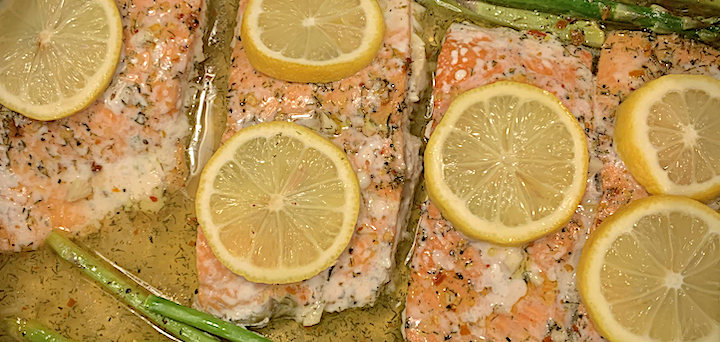
I think the commute time and distance is the single biggest money-suck for most Americans when it comes to work. I live in the Washington DC area which has the worst traffic in the country (we’re usually neck and neck with L.A. depending how they measure). This fact is widely published and known. Most of the people here move here for a job, and it still amazes me how many of them purposely buy a house or even rent a place a good 40 minutes or more from their job. That 40 minutes is in perfect conditions – which happen maybe 5 days of the year here. In reality that 40 minutes turns into an hour in the morning and 1.5 hours in the evening.
Then they complain about spending all their time in traffic! I wanna say “You knew the score before you came here, or your Google machine should have told you. You made your choice..”. But they want the 3000sq ft house instead of the 1500sq ft house, which means further out in the burbs, which means a life of misery.
Fascinating. I am from Chicago and for us, it came down to living an hour out on a commuter train line into the city in a good school district because we could not afford private school in the City. I think the school is often what pushes people into the suburbs here; we were willing to live in a small place, but we could not afford that and private school.
I chose to park 0.6 miles away to get free parking at my most recent job. Parking just outside it would have cost $30/month.
Most of the work spending doesn’t help create promotions or anything. Nobody cared that I packed my lunch, walked a little extra everyday, and wore the same clothes in different ways.
The spending I did do for promotions and to advance was go out for dinner when traveling overnight for work. It helped me meet coworkers in other offices and wasn’t always reimbursed.
If you have room to take your bike with you, you can make that 0.6 miles go by much quicker.
Great tips, all. Back when I was working, I saved by packing a lunch every day and passing up the chance to tag along on daily coworker lunch runs at $10-12/day. Maintaining a fairly consistent level of fitness and weight helped as well by not having to revamp the wardrobe. And Mrs. FFP both did and still does a bang-up job of giving me a haircut that looks as hip as they come.
When I think of the cost of work, I’m always reminded by the classic Mr. Money Mustache article “The True Cost Of Commuting”. In it, MMM lays out the math for how each mile of commute to a daily job paying $25/hour costs about $795/year in commuting costs. Translated to 5% mortgage interest, that’s the equivalent of buying an additional $15,900 worth of house. For a double-commuting couple, each mile doubles this figure to $31,800 of house.
https://www.mrmoneymustache.com/2011/10/06/the-true-cost-of-commuting/
I have to admit I feel some pressure of cooking presentable and professional in the workplace to be taken seriously. After I started working, I went on a work clothes shopping spree that cost me probably $400-$500 in total. But it was 3 years ago, and I have rarely bought any new work clothes since. I’m actually on a clothing ban this year and haven’t bought any clothes, shoes, or accessories, which I’m super happy about and proud of (Thanks for the inspiration! 🙂
I think that not eating out at lunch and not shopping at expensive stores repeated will save us lots of money. At the end of the day, it’s all about our preferences and ways of life. Work might just be an excuse to spend money. If you’re frugal, you can do almost everything on the cheap. If you feel like you deserve something or want to spend money, there’s always a seemingly legitimate reason to do so 🙂
Thank you for this! You totally hit the nail on the head with: “If you’re frugal, you can do almost everything on the cheap. If you feel like you deserve something or want to spend money, there’s always a seemingly legitimate reason to do so.” SO VERY TRUE!!
I’d like to add, check out Lynda.com for amazing continuing education tutorials on TONS of software and office/business skills (e.g. marketing, copywriting…) It is a relatively cheap monthly subscription, but you probably won’t even have to pay that as your local public library is very likely to have a subscription you can access via your card. The public library is also a really good resource for articles for continuing education, just ask your librarian!
Depending on where you live, you can get it for free. Universities, libraries, and other areas offer free subscriptions to Lynda.com
The biggest expense I’ve had due to working has been my home. I work in NYC. If you want to be in a “good” neighborhood, the closer you live to New York, the more expensive it is.
When we were a two income household, we spent the money to live close so we could best enjoy the time we had outside of work.
As a one income household, we moved further away and have a house instead of an apartment while spending less. This was possible since I’m the only one who has to commute.
When we are a zero income household, I expect to move again and for our cost of living to decrease dramatically.
People have commented on the expenses of participating in Continuing Professional Development activities. Sometimes if you apply, and are accepted, to be the speaker at a PD event, you can attend the event for free (or at at discounted price). Also, if you volunteer with your professional association (e.g., to serve on committees or help with registration), you may get further discounts/stipends/reimbursements for conference attendance. I have been an Awards Reviewer for my association for the past few years. This has meant being invited to breakfasts and receptions to honor award recipients. Given that food can be so expensive at conference venues, the opportunity to have a free meal is appreciated.
Great advice! Thank you for sharing :)!
I used to love to go to thrift stores in the ritzy areas of town to buy clothes for work! There’s nothing like that thrill of a deal. I stay home now, so I’m thankful I don’t have to worry about what I wear!
Thank you for this post! It hadn’t occurred to me to think about how much it costs to work. On the whole, I have become much more frugal in the past couple of years, but the biggest thing that probably helps me (through no effort) is that I’m an introvert. I inherently don’t like going out for drinks after work or going to lunch with people. I don’t want to go in the first place, so it’s pretty easy for me to turn down invitations. I wonder, how do extroverts deal with skipping drinks/lunches with coworkers when that’s something that makes them feel better?
In one of my side hustle gigs as a hostess right out of college, I was told by my manager to dress up a bit. She was very careful saying it in those words but that’s sort of when I said ‘oh boy I’m glad I’m not going to be stuck here working for the rest of my life!’
I don’t want to work in ANY place that tells me I have to dress up to be a good worker. With exception of fancy law offices but even then I’m like….hellllll no.
The biggest and best takeaway is that work, performance, and good vibes “is what people notice, not your hair or dress.” I love that 🙂 some girls go for the PERFECT look. Like the whole gel nail polish thing…a mile long?! I think DIY nails work just fine if you wanted to do nails even. But don’t go in with cake on dirt under them and you’ll be fine. There’s beauty in natural.
I held on to my car when I lived in the burbs of DC because how else was I going to get to work (further in the burbs) or to Target? I wasn’t paying for parking so I didn’t think it was a huge expense. Three years in, I finally sold my car and took the bus to work and the metro into the city for entertainment and I was SO annoyed with myself. I could get a bus pass that was something like $15 a week, which ended up being significantly cheaper than my insurance let alone gas and maintenance. It only took a few more minutes to get to/from places and I could read and not be totally road raged by the time I walked in the office. I also didn’t have the stress of having a vehicle. We now live in a place where it wouldn’t be wholly practical for us to be vehicle-less, and I sometimes dream of those car-free (Siri autocorrected to carefree, so wise) days.
When I lived in DC, I worked in an office that was pretty dressy and I hadn’t yet discovered second hand. I did quickly learn that a dress is one piece of clothing vs. a pant/skirt + top, and is therefore much cheaper. So I wore a lot of dresses, and if they were fancy enough I could get away with not wearing a suit jacket. Lands End had some lovely faux wrap dresses that were solid colors and washed beautifully. I always purchased those when they were on sale.
I now live on the west coast, which is a much more casual place and professional clothing is much cheaper. At the last nonprofit I worked at, I saw a few social workers come to work in what I swore had to be pajama pants on days that they weren’t meeting with clients. If I had their tough jobs, I’d probably want to stay in my PJs too.
I read Your Money or Your Life years ago, and the entire Tightwad Gazette series. Picking apart finances became second nature. As an irregular size, I bought second hand or on mark down and found a tailor. Many of those clothes lasted me 20 years or more. Packing lunches and reducing the numbers of out of office meals, which I had seen as a treat/bonus for earning a paycheck were dramatically reduced. I made lunch bags for myself and the kids. We ate healthier and cheaper thereafter. I put the kids lunch savings into college funds and mine into index funds.
Shoes I bought on sale and then resolved and redeemed them regularly. Local beauty schools give low cost hair cuts for a fraction of the cost of a stylist. As a manager I felt obliged to give gifts at holidays. I made jam and gave little jars with a gift certificate to a local bakery for bread to put it on.
The thrill of saving more of my paycheck and using it for good – college, charity, vacations, savings was unmatched.
I had a diet soda problem. Soda costs a lot in vending machines. I bought it in liter co tsinere and then filled smaller containers to bring to work for my daily fix. It cost me 1/4 of the cost and I never felt deprived.
I would like to note that for those of us that are not into a classic or neutral wardrobe (which I 100% respect) thrift stores also have excellent options if your looking to stand out in your clothes. I am a former punk kid who only wears black and grey as a rule and loves skulls, studs, draping and the generally gothic. I go to a Goodwill near the mall in a nice section of town and I find all sorts of clothes from Torrid ( I am also plus size) and weird things from H&M/Target/Forever 21 plus and other mid price clothing stores. Almost all of my clothes are thrifted and I always stand out in the ways I want to. I am very much against suppressing my personality for my job and I hate dress slacks yet I have always made the dress code work for me. Business casual doesn’t have to be boring! I do not put anything in the dryer so even fast fashion thrift finds last me years.
I have recently started working exclusively from home, which makes me sad cause I never get to wear all the great clothes I’ve collected (but is still so much better than commuting).
Wonderful advice! Thank you!
These tips are so helpful, thank you for compiling them! I especially love what Liz wrote, “I have largely given up caring what other people think and because of that I’ve come to realize that, most of what we think other people think, they don’t.” It’s definitely challenging to unlearn the habits of people-pleasing and letting go of external validation, but I think living a life true to my own values would bring me the most joy.
I am an RN in a nursing home. I work 11p-7a shift. Company provides scrub tops with company logo on it. I always wear a pullover under due to cold at night, even in Florida. I have scrub jackets that I have had for years, I wear to work, take off as soon as I get there and wear home. I wear socks and Walmart 12.00 memory foam rubber sole slippers. So comfortable. My pants are from thrift stores and some that I have had for years in tan color. I have total of 7 tops, 7 pants and 4 jackets. My wardrobe costs me maybe 30 a year and most of that is the cost of 2 pairs of shoes 24 for 2. Once they are beyond workwear nice, they become around the yard shoes. Thrift stores and goodwill have loads of nurse clothes. May take time to find the specific color you need but the pants do not have to be scrubs. Other pants will suffice. I am not constantly on my feet anymore like I was in the hospital but even then I wore good supportive tennis shoes which were bought on sale. I love wearing soft shorts at home with a tank top. I have certain ones I sleep in and wear to take the dog out in am. Then I change into others for around the house during day. Basic wardrobes can be so cheap. Just don’t gain weight. Stay the same size throughout your life for building a long lasting wardrobe. Also use good laundry detergent and do not dry your clothes to death. I dry for 10 minutes then hang in garage to dry. We extended an a/c vent into garage when we had a/c replaced so it is climate controlled in garage. Not as cool as house but comfortable and keeps clothes from mildewing. It does not increase our electric bills.
Loved this article and just signed up for my first round of the Uber Frugal Month!
I spent most of my career in NYC so wearing black, blue, and dark gray was the norm and is most of my work closet. It’s great because people don’t notice how small my wardrobe is so I can repeat outfits more often (my bright peach sweater not so much). If I am running low on clothes due to wear and tear I do buy new but only from Banana Republic (just like the reader in the post) because they usually have 40 or 50% off. Also the new clothes tend to last me years versus consignment. For us shorter ladies, they have petite sizes!
When it comes to continuing education. I looked into an MBA but the costs are obscene and most very successful people I worked with in NYC didn’t have a second degree. Although some opted for CPA or CFA (much cheaper than MBA). For me it paid off much more to network with colleagues (usually in their office or a conference room, which is free) and bust my butt at my job than to pursue another degree.
Three things that have made the most difference, financially, in my career were: 1. Not being afraid to have candid promotion and salary discussions based on what I had contributed to the company. 2. Always bringing lunch. When did salads become $16? 3. Moving to a lower cost city. I was able to have almost the same salary as I had in NYC but with significantly lower costs.
We both work full time and have 2 young kids so I get zero free time to go thrift store shopping and try on clothes. Due to this lack of free time I usually just buy cheap clothes online (Kohl’s, Amazon, JC Penney).
Are there any other options I’m missing?
Also I’m currently pregnant with number 3 and discovered that a lot of my old maternity clothes have visible stains that won’t come out. With no time for the thrift store how can I relate these cheaply? Most of my similarly sized friends have long since gotten rid of their maternity clothes.
Another mom of three, so I hear you on NO TIME TO SHOP!
Have you tried RIT dye on your stained maternity clothes? I’ve done it with good results on casual clothes.
Dye them a shade or two darker! It works great on natural fibers. And you can do it in your washing machine.
You can also try online second hand shopping — thredup!
A quick story about a classy lady. I’m a minister (now retired), and I conducted the weddings of a family’s two daughters about a year apart. The mother of the bride(s) wore an absolutely stunning dress — at BOTH weddings! (Remember, this was the same family, so many of the guests attended both weddings.) I thought it showed an admirable attitude of “I know this dress looks great on me and I’m gonna wear it for two special occasions, so get over it.” (She never would have said that out loud, but I knew this woman pretty well and I’m sure that’s what she was thinking.) A totally class act!
My mom wore the same dress for my wedding and my sister’s wedding! We all agreed it was a great dress and that it should be worn more than once 🙂
Haircuts for <$10 can be had at beauty schools. My friends and colleagues have accepted that I will join them at a bar/coffee shop/restaurant and hang out, and I always tip the server even if I just order water.
I haven’t had to wear “professional” work clothes in a couple of years but all of the clothes I did have were brand name from second hand stores. I just got offered an exciting job where I get to work from home so have no need for any of my work wardrobe anymore. I decided to post much of it on my local Buy Nothing FB group. Figured someone could use some quality free work clothes!
dry clean only is mostly a scam – I have machine washed lined suit jackets and pants without any mishaps other than an occasional repositioning of shoulder pads.
Why is it that the world is so obsessed with appearances? There’s absolutely no need to worry about fashion at work.
I certainly never did. My “spending to go to work” was essentially zero for a very very long time and it paid off.
I guess deep down people want to look nice in front of others, and spending is how they frequently do that.
If you stay as fit and healthy as you can I think that shows in your appearance and will do much more than expensive clothes and make up. I’m a guy so I’m no make up expert but my wife and I run and get a lot of other exercise and while we do not spend much on clothes we get a lot of compliments about them anyway. I wear off the rack $250 suits but I’ve been accused more than once of wearing $3,000 suits and I think it is just because they look better on a runner than on a sedentary body. I would say you are the poster child for that concept but I’m afraid of Mr. Frugalwoods, so I won’t!
Capsule wardrobe for the win! I love throwing anything together and it all goes well and can be worn for just about anything (save my loungewear and yard work clothes).
For commuters, check to see if your company has a pre-tax benefit for commuting! In D.C., we can pay for our WMATA transport and parking pretax. Huge money saver and you never have to remember to re-up your Metro card!
Agreed! Being in marketing isn’t as image-focused as many people think. I’ve been marketing for five years and have never felt pressured to look picture-perfect. I do love having nice nails, but instead of going to the salon, I like to get those press-on nails. They last 3-7 days, but they’re perfect for a big client meeting or event.
I love this so much. Thank you all for your thoughts. When my husband quit his job, and we did the shocking math, it turned out we were essentially spending all of his salary an his work (to be fair, he was dramatically underpaid).
I will add that a work uniform does not have to be a neutral color palette. I wear colorful and patterned dresses on rotation, and nobody has ever called me out on having 9 of them. Truly, nobody cares.
What an interesting combination of ideas! Choose good mentors for yourself and let those people know how they are important to you.
This will age me– No one wrote anything about nylons or panty hose or bare legs or tights or footies. What do you wear with skirts when you wear them?
Having properly fitted clothing, especially undergarments, especially bras, makes every outfit look better. Women who don’t know how to walk comfortably all day with their chosen shoe heights or tiny sizes draw unnecessary attention to themselves.
And over to food: If you are in line at an appetizer buffet, note the layout and plan accordingly. Veggie sticks will be first on the table, so people fill up their plates with the cheap stuff. The expensive hors d oeuvres (my favorite food!) are farther down the line. Similarly, meal buffets have bread and vegetables first, main dishes at the end, when people have less room on their plates.
I think a lot of people in my generation go bare leg with skirts. In cooler months, leggings. Tights were popular again a few years ago too.
Had to smile at the teacher realising that the students don’t care what she wears. Two anecdotes: (1) as a child, we always knew what day of the week it was by what my Yr 5 teacher wore – she had a Monday dress, a Tuesday dress…I kid you not. I think we all would have been very confused if she’d worn them in a different order one week. Kudos to her for making her life easier with not having to choose which dress to wear when. (2) My husband is a high school teacher. He wears bow-ties. The kids notice. He’s been given nice, real bow-ties; nice, pre-tied bow-ties, and joke bow-ties by graduating students. 🙂
Other frugal clothing tip – loathe clothes shopping because there’s never anything that fits your shape. 😉 I’m only half joking here. I truly loathe clothes shopping – the whole take shoes and pants off to try on some other pants that are very unlikely to fit; take hat, glasses, and top off to try on some other top that is likely to be see-through or with a neckline that exposes everything; then put the whole shebang back on in order to return those clothes to the rack and go through the whole process again. Stuff that actually makes its way into my wardrobe gets used to the point of falling off, literally, after much mending.
I’m with you on hating clothing shopping!!! I haven’t been in years and I’m such a happier person for it! I so prefer my random hand-me-downs and free finds
This is where working as a lowly freelance at-home-part-time-no-advancement-worth-mentioning is worth an amount that is hard to fully calculate! The only thing I require is a solid internet connection / decent bandwidth (which happens to be largely underwritten by my husband’s work since they require him to have this at home for emergencies – he’s in support, so it is quite important), and a set of headphones for some things. That is it. That is all. I call my own hours, I am fairly remunerated for literally every fraction of work I do, there are no childcare costs at all. I’m around for from-scratch cooking, home admin stuff, and while we do have a cleaner, we live in Cape Town, in South Africa, where it is really very common, and though I might have fewer visits each month were I to not work at all, it is not a big financial difference, and far, far cheaper than childcare, wardrobes or commuting or anything like that.
It’s not all roses, it can be a bit lonely, it can be a bit frenetic trying to wear all the hats from time to time, but there is no job where that isn’t the case that I can think of! I offset the ”where are all the people” feeling by volunteering at my children’s school on a regular basis, and by participating in very inexpensive local exercise groups (pilates and zumba), which is great for the waistline and for staying social beyond ”kids kids kids, work, kids”. It’s something for me and me only, with other women… doing something other than eating chocolate on the couch.
I’m with you! I love the flexibility and freedom to slot work in where it fits between kid activities (which are more like baby activities right now… 😉 ).
it’s a very busy time, with kids under two, your life really isn’t your ”own” to a large extent. Once they are a little bigger, and going to play group a couple of mornings and everyone sleeps more or less… the freedom is amazing! It’s certainly not to wish away each particular season, but I personally did not love those early-early months with my babies as such. I loved them, and of course found very happy times in the duration, but it gets to be much more fun once they’re toddlers in my opinion!
I have become very spoilt with calling my own work shots – when some random appointment takes me into anything approaching busy traffic, I get all whiney and irritable ”what’s going on?” when actually it’s just a tiny slice of most people’s normal commute! Basically, I am now unemployable…
A number of years ago I read some really good books on how to flatter your figure and came up with a basic look that works, it’s my uniform. I realized earlier this year that my favorite work pants are nine years old. I have 4 pair of black heavy straight leg knit pants that fit me like a dream, are super comfortable, and are very flattering. They are very similar to the business pants that are really yoga pants. Any time I have a rare event to attend, and ask my kids what to wear they always advise me to wear those pants because they look so good on me.
I hit the clearance rack at Macy’s about once every other year for tops in the style that flatters me and have noticed that in 10 years they offered the same basic styles but have changed colors, prints and embellishments to keep on trend.
I have arthritis and an injury that prevents me from wearing heels. After trial and error I have found a few brands that carry cute flats that are flexible enough for my feet, can work for business, casual or dressy and are fairly inexpensive if you shop sales at discount stores. Rocket Dog is on brand and sketchers is another. Leopard/cheetah is my signature print and I have pieces that are over 10 years old that I still get compliments on every time I wear them. My jewelry is a copper bracelet intended to relieve arthritis pain but gets a lot of compliments.
Even with limitations like mine, if you determine your basic signature style and look for frugal ways to build your closet your appearance will be polished, professional and uniquely yours.
I’m another one who hates shopping for clothes (exception: when I lived in Toronto and would visit Kenzington Market thrift stores!). Even when I was working in office settings, I never felt the need to spend a lot or impress with my clothing. I think part of spending less money is realizing the ‘why’ of your purchases. Putting less pressure on yourself, and caring less what others think of you and your lifestyle choices is very freeing, and frees up money in your wallet too!
I have noticed that sometimes lower paying jobs expect polished wardrobes for women. Men are judged on a different scale which is outrageous but true. I once passed on a a job opportunity because I would have been forced to spend way too much time on my appearance. Back in those days we were forced to wear pantyhose!! I thought of all the office gifts I’d be expeected to buy and lunches with the girls and all things considered I would have been lucky to break even!
I have noticed this too! It’s entirely unfair and though the disparity is decreasing, largely sexist. My mom, a trailblazer in her way, caused an actual crisis meeting when she had the sheer audacity to appear to her (very senior – by far the most senior woman in the company at the time) job in… a trouser suit. Yes. A pant suit. With pants. The horror! It was freezing cold and she suddenly thought ”no” and the old farts on the board went mental and then couldn’t think of why she shouldn’t be allowed to (so demeaning), and thus the door opened for the other female employees to -gasp – wear office-attire trousers and suits if they chose! Imagine! What next? Bikinis?
Mind you, this was when she was actually refused, by a 20 year old salesman, a hire-purchase agreement because ”hubby needs to sign off or he might be cross”.
I went from a job where I had a uniform, to one that is business casual. I also took a massive pay cut, but to have less stress in my life, it has been worth it! I had to find nice clothing (I didn’t have much lol), and shoes were my biggest issue. I spent over $300 bucks trying to find comfortable dress shoes! It was a freaking nightmare! I am flat footed, and wore Nike tennis shoes to my previous job. My feet/ankles were in so much pain the first 2 weeks, I almost regretted taking the job. Finally, I found Alegria shoes, which are pretty expensive, but wonderful! They also have sales, so I will be able to get them cheaper when I need a new pair. I am kind of creating a uniform for myself, basic pants, basic tops, and I have tons of jewelry I’ve collected over the years, so I can mix it up. I do wear makeup, but get it on sale, usually through Avon. Even with all the adjustments, it has been worth it! I felt like my happiness was worth more than my paycheck!
The clothes one is a tough thing to break for many women! I was rather anti-fashionista growing up but got suckered into believing I had to become one once I entered the corporate office world. Once I got bitten by the early retirement bug it still took me a while to shake the shopping bug (even though it was never really “me” to begin with). But then I came across the ERE post on clothes and just loved his ‘classic-boring’ concept for office wardrobes. I decluttered my closet down to a small circulation of conservative office-y colors that suit my tastes (black, white, gray, navy, eggplant, olive) that mix n match easily and my clothes shopping has slowed down to a trickle.
Another good anecdote was in Kelly Cutrone’s biography in which she details that she WAS a natural-borne fashionista and eventually became a successful PR agent for top-end fashion events in Manhattan – but being too busy to fuss over her daily outfit she relies on a wardrobe composed entirely of black clothing. That would certainly remove the need to shop frequently for work clothes!
I have been an attorney for 31 years. I have four children. The kids are in their late 20’s and early 30’s now. I never had a housekeeper. I bought clothes when needed, but since I practiced law primarily in small rural towns, I could get away with reasonably priced suits early in my career from The Limited (which I understand is now closed) and J.C. Penneys. I now buy from thrift stores, as they are much more prevalent in my area now, than they were years ago. I have zero fashion sense, and since I am older, no one seems to care….lol. I work for the state government and my CLE and attorney dues are paid for by my employer. I did not do any socializing with others except at kid functions when they were growing up (baseball, band, etc.) I still do not do any outside socializing. I am too busy getting ready for criminal jury trials. I cut my own hair, and most folks I work with pack their own lunch, like I do. There is no time to run out to get something to eat at lunch. I try to spot clean any clothes that have to be dry cleaned, and dry clean only when absolutely necessary. My only cost is transportation because I live in a rural area, and help handle dockets in five counties. I bought a Toyota Yaris, for good gas mileage, and it was inexpensive for a car. No one expects a government lawyer to drive a fancy car, so there is no pressure there. Plus, I just do not care. I pay my bills, and how I spend my money is my business.
I like your attitude. I have a daughter studying law and have been teaching her to shop at thrift shops. Her female peers seem to have amazing financial capacity and dress to the hilt just to attend lectures. I dread what it will be like for my daughter once she is employed.
Love this post! Many great ideas and comments being shared here. It is definitely hard staying frugal when you are advancing in your career because you are more likely to be more busy and taking into consideration the commute and taking care of the kids if you have any, it can get really overwhelming to keep up your frugal habits on top of everything. If you are making more in your career then I feel it is okay to spend a bit more (not too much) to relieve the stress. What good it saving money if you are miserable doing it. It all about a balance!
I prefer bright colours and interesting/unique items (ruffle, zebra print, pom poms, interesting neckline) to black or neutrals. I wear a put-together outfit every day (often a dress in a bright colour) and don’t care if people see it once a week. I do need to ban summer clothes buying – the season is very short where I am (Toronto) and I have plenty.
I bring my lunch, make my own coffee, and have a fairly strict no extras rule – I don’t go out for a staff lunch, staff drinks, do Secret Santa, contribute money to anything really. I agree with the Reader who said a heartfelt congratulations or condolences is just as good.
Another thing I’d point out here for unionized staff is to thoroughly read and understand your collective agreement. I work for the government and we have generous and myriad leave provisions – dependent care, religious observance, union work, self-funded leave, etc. Don’t “spend” a vacation day if what you’re doing falls under a paid leave. My union also partners with vendors like Apple, airlines, train line, phone companies, furniture stores, to offer great deals for staff. I’ve been on an amazing phone plan for 14 years, all through my union.
I totally sympathise with the lady who mentioned constant collections for birthdays, weddings, babies, retirement…… My own tactic is the same as hers; decline politely and make a nice comment to the person instead. However, it can be very pressured; sometimes saying honestly “I’d prefer not to, as I’m on a limited budget, but thank you for asking” is the best tactic, as otherwise co-workers can feel offended that you’re not “joining in” and paint you as stand-offish. Other challenges I’ve come across are the Great Christmas Card Exchange (send a nice email round saying you’re making a small donation to a charity instead of sending cards this year), the Birthday Cake Expectation (buy the office cakes on your birthday); difficult to get out of, this one, especially if you’re greedy like me and eat other peoples’ :-), but if you bake, bringing in a box of brownies or biscuits or tiny cupcakes is an option. Otherwise, maybe bring in a bag of sweets for people to share. Alternatively, again, make a small donation to charity on your birthday and tell people you’ve done that rather than bringing in cakes. Top tip – if you don’t bring cakes on your birthday, you probably shouldn’t eat the ones other people bring in… ;-).
Finally, the Charity Challenge -“I’m (cycling across Nepal/running my first marathon/doing a triathlon/walking the Appalachian Way/selling raffle tickets/collecting for my child/partner who is cycling across Nepal/running their first marathon/fill in as appropriate) for CHARIDEE!!!, would you like to support me?” Don’t get me wrong, I’m a big supporter of charitable giving, but in a big office one can end up giving ££££ to other people’s good causes. (I also found that, having supported numerous people myself over the years, surprisingly few of them supported me on the only occasion I made my own appeal, which miffed me slightly, I must say, although obviously I didn’t say so!). Some people are also serial appealers, constantly asking for money for their pet good cause. Again, it’s difficult to not donate, as peer pressure comes into play; I find it best to say outright that I have my own charities to which I give regular donations every month, and that I find that a better way to do my charitable giving, so I won’t be donating to their appeal, but I wish them every success and thank them for asking. There’s something about being honest and direct but also friendly which tends to disarm people and make it hard for them to take offence at a refusal.
Pre-stocking snacks at work has been a game-changer for me. I found if I had an energy crash during the day, I’d be tempted to go to coffee shop downstairs which could mean getting a snack AND a coffee/tea/hot chocolate. Having a well-stocked cupboard of tuna cans, instant oatmeal, crackers, peanut butter, etc has completely eliminated that. Also, on the rare day I forget my lunch, I don’t have to spend a nickel on eating out. Keeping them stocked at work also means I’m not forgetting to pack the snacks in the morning.
Wow that was a lot of great feedback! I had never thought of the idea of paying to work before joining the FIRE community. One thing I did learn from the days of Stacey and Clinton were solids always match. And I always try to buy things that don’t commit me to another item, i.e. sheer clothes, or clothes without sleeves that I can’t wear to work without a sweater. Still having frugalized my lunches yet, but one day….
Oh! Also stopped by to say I enjoy your blog so much I did a little spotlight on it on my blog! Stop by and check it out! Just published today. 🙂
The comments seem to be mostly from people who are well settled in their careers. I’m wondering about the costs of starting a new job – when I start my first out-of-uni job (not first job ever lol), I want to get to know my colleagues in the beginning and develop good (working) relationships. And most socializing gets done during lunch breaks, I’ve noticed. So, how do you stay frugal while joining a “lunch group” of colleagues for networking/bonding purposes, without becoming the weirdo who only orders a glass of water (I’d hate that)? My line of thinking is to just bite the bullet and join in in the beginning, and when you’ve developed good relationships you can still do your own thing or even convince the others to bring lunch too. I’d be very glad to hear from others who have made some experiences on this topic!
Generally, if we go out to lunch, the bill is divided equally regardless of what is eaten and we buy drinks in rounds so it is a choice between not going or paying full whack. Opting out is frowned upon so I need pay up at least sometimes!
Someone pointed out a very important point. Being or getting to your ideal weight makes finding good clothes much easier and cheaper than being heavy. I’d like to read how other people get or stay in shape frugally. And of equal importance, how do others keep in decent clothes while they are losing weight, especially if it’s a significant amount, like over a hundred pounds? For me, doing Leslie Sansone’s, “Walk at Home” program is so simple, and because she did most of her DVDs ten years ago or so, I find them in thrift stores for two or three bucks all the time. And the same applies to any other exercise teacher. And Youtube is loaded with free exercise programs. You could probably learn from a different teacher for a month. As far as buying clothes to exercise in, I simply skip that part and do it in just undies and shoes in front of a big fan. That way, I don’t have to buy or wash clothes, and because I’m constantly cooled by the fan, I don’t really have to take a shower afterwards either, thereby saving myself money all around. As far as keeping in clothes while I’m still losing the weight, (all 70 pounds of it) I’m a stay at home writer, so I just cheat and use baby pins to keep my pants or skirts and the back of my shirts from falling off of me, and if I’m going out, I simply put a long shirt over everything to hide the pins, and so far, nobody has called me on it.
Just reading this I think I have saved a lot of money. Well, to be honest, it took me about an hour to fully go through this and I am still so bewildered at the fact that there are so many things that I haven’t done so far. Rationing breakfast and lunch and dinner is something that looks the most difficult to me, but i think I will come around to it as food is the most that I spend on.
I also like your idea of making wise choices with clothes. Will definitely keep it in mind next time I’m at a shopping spree..
Love this post and can definitely relate! I work a tough job in management consulting and usually from 9 AM to Midnight Monday-Thursday (9 to 5 on Friday). I live in the NYC and have so many extra expenditures because of my job. Whether it’s the business formal attire or the daily $15 lunch. It’s so hard for me to prepare meals after working for so long every day and I enjoy food quite a lot. So I always grab a nice bite to eat during my 30-minute break at work, this definitely adds up! Luckily, my company pays for my dinner, but I’m now starting to feel the effects on my health. As a relatively fit and active person being sedentary for so many days of the week is definitely starting to take its toll, which may be a long term cost. Hopefully, I can make some changes.